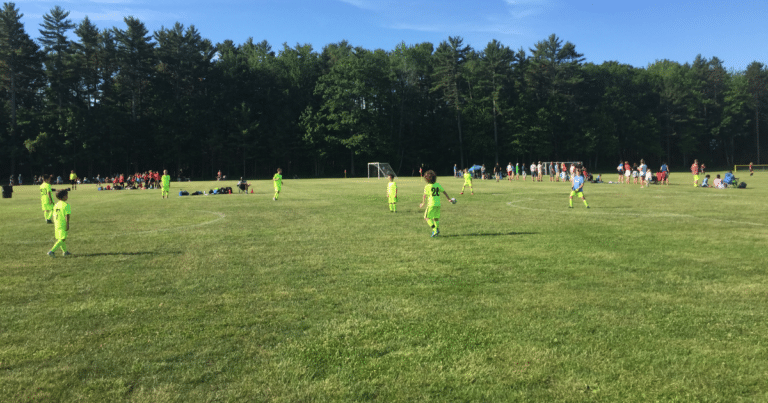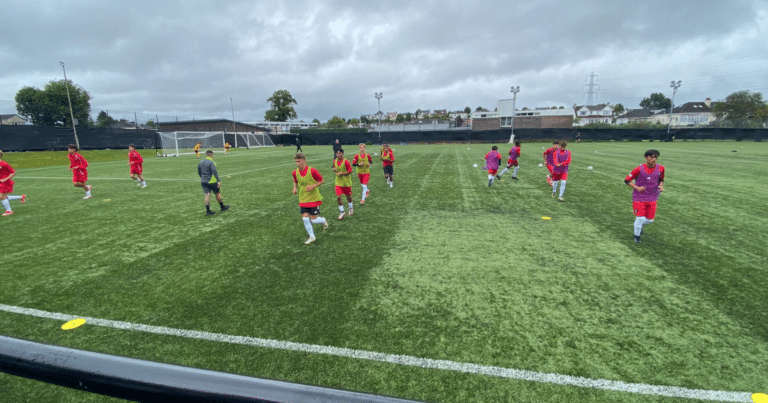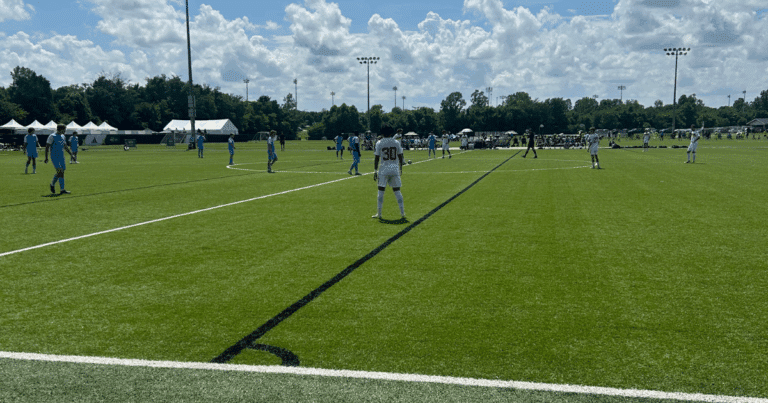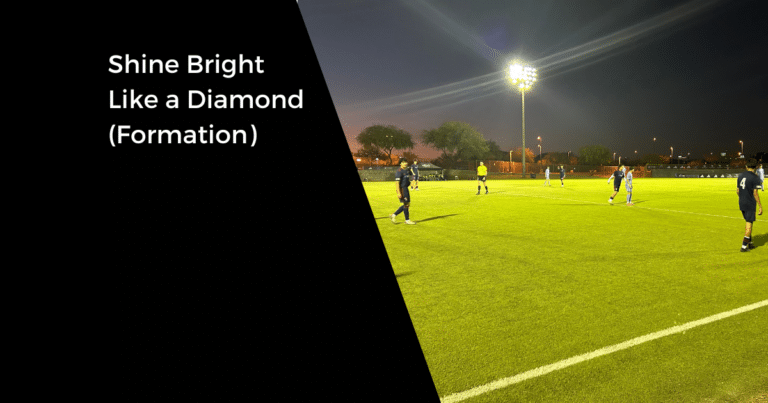US Soccer Coaching Licenses

Being a soccer coach can be a very rewarding and fulfilling profession. Soccer coaches make a direct impact on their team’s development as a result of dedicated training sessions they do over the course of a season. If you are looking to pursue a career out of it, understanding the different levels of U.S. soccer coaching licenses is a must.
 Like many other professionals, meeting certain criteria and obtaining certifications can be advantageous to the career of a coach.
Like many other professionals, meeting certain criteria and obtaining certifications can be advantageous to the career of a coach.
Becoming a soccer coach might be the perfect job for someone who possesses great admiration for the sport and a knack for inspiring others to achieve their goals.
In this article, we’ll lay out the different coaching licenses one will need to be a soccer coach in the United States.
Where Do You Start?
The soccer coach pathway in the United States is governed by the United States Soccer Federation (USSF). The USSF offers a variety of licenses, each having specific requirements and purposes. The pathway starts at the grassroots level (under 6 years of age) and continues through to the professional ranks.
One of the best parts of coaching is the opportunity to continue learning and improving in a sport you enjoy.
Many adults enter youth coaching because they want to give back to the soccer community and influence the next generation of young players.
Som coaches are driven to stay in the industry not just by their passion for the game but also their desire to maintain the highly competitive lifestyle to which they have become accustomed.
No matter what drives a person to seek coaching, there are many options and paths to take a career.
Outlined below is an overview of the licenses provided by The United States Soccer Federation (USSF) along with their purpose and cost.
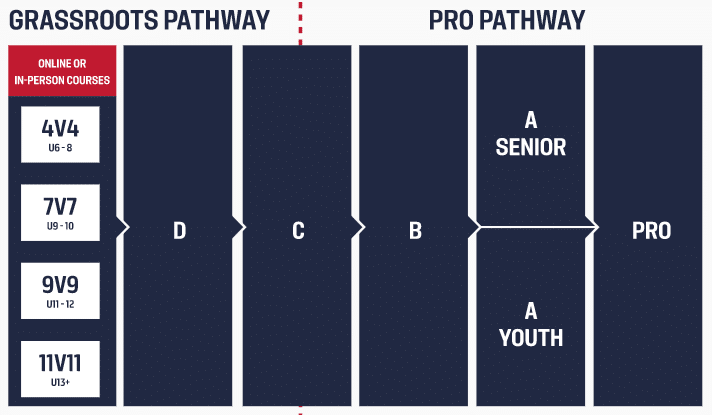
Grassroots
It’s the beginning of everything. An online introduction to grassroots coaching serves as the first module of the introductory course. This leads to courses with fewer players on each side (4 vs. 4; 7 vs. 7; 9 vs. 9; 11 vs. 11). Those classes can be taken either online or in person.
After that, coaches can start in-person or online courses, but they need to finish two in-person or blended modules to get the D license and move up the coaching ladder.
Additionally, each in-person session will be around 4 hours long, split between 2 hours of classroom time and 2 hours of field time. If courses are “stacked” together, the length may be reduced slightly because part of the information is repetitive.
- Purpose: To prepare coaches to work with u6 (4v4 courses) through u19 (11v11 courses).
- In-Person Cost: Approximately cost $100 (set by hosting member)
- Online Cost: $25
 D License
D License
The D License is an introduction to coaching and is required to lead teams from u6-u19 at a beginner to intermediate level. Coaching applicants must be in charge of a team that actively competes and gathers for practices at least once per week.
The emphasis is on full-sided and small-sided drills during training sessions, as well as what U.S.. Soccer refers to as the six roles of the coach:
- Coaching Games: Creating an environment for players which guide them to give their maximum effort in order to develop their skills and score more goals than the opponent.
- Coaching Training Sessions: Develop players to reach their fullest potential as well as prepare them for game-play.
- Leading the Team: Fostering an environment where there is inclusion and opportunities to reach well-defined goals.
- Leading the Player: Provide personal attention and mentorship to help them grow as a person and player.
- Managing the Performance Environment: Influencing off-field circumstances in order to create the best possible conditions for player development.
- Leadership: Aligning actions that are guided by a player-centric philosophy in order to accomplish defined team and player goals.
D license classes are broken up into one or two on-site sessions, virtual meetings, a self-paced learning phase with assignments and guidance from instructors. The full duration is around three months.
- Purpose: To prepare coaches to work with youth teams (u6-u13) in a participation environment.
- Cost: Approximately cost $250-$450 (set by hosting member)
C License
You can upgrade to a Class C License after one year of obtaining a Class D and if you are currently coaching.
This license will get you ready to coach more advanced U11-U19 teams. Each coach should have at least two or three weekly sessions with more independently driven athletes.
Two five-day classes are separated by six to eight weeks of mentoring and coaching assignments. Expect it to take about four months to complete your C License certification.
- Purpose: To prepare coaches to work with youth teams (u11-u19) in a participation environment.
- Cost: Approximately cost $1,200-$2,000 (set by hosting member)
B License
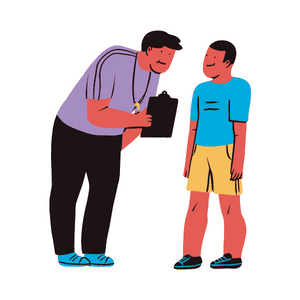 You can apply for your B license once you’ve had your C License for an entire 12-months and have three years of coaching experience under your belt.
You can apply for your B license once you’ve had your C License for an entire 12-months and have three years of coaching experience under your belt.
Additionally, admission includes having access to a u13+ team for the full duration of the course (January-June or July-December) and a signed letter from the club leadership.
This license is for coaches who have a solid grasp of soccer and are looking to take charge of a U13 or above team in a competitive setting. Anyone holding a B coaching license will be able to effectively implement and assess player and team development.
There are two in-person, virtual meetings, individual and group assignments, independent learning and 1-on-1 meetings with the instructor. To obtain a B License, it will take about six months to complete.
- Purpose: To prepare coaches to work with youth teams (u13 and older) or adult teams in a performance environment.
- Cost: $2,750
A Youth License
A coach is qualified to receive their A Youth License once they’ve had their B License for six months, have four years of coaching experience, currently coaching and is working with an elite youth soccer academy.
Coaches will have to go through three five-day in-person classes and six to eight weeks of assignments and mentorship, a collaborative project, and exit interview. All in all, it will take about ten months to get this type of license.
- Purpose: To prepare coaches to develop youth players and teams (u13-u19) in a high-performance environment.
- Cost: $3,500
A Senior License
The A Senior license differs from the A Youth license in that most people who focus on it want to coach senior-level teams rather than youth teams.
This coach’s pathway is to lead highly competitive senior teams. Teams would consist of players older than 19 who are on the path to becoming a professional soccer player.
Similarly to the previous A Youth License, this course will take about ten months to complete. Coaches will have three in-person meetings, virtual meetings, independent learning, workshops, expert seminars and collaborative analysis.
- Purpose: To guide coaches to develop competencies to lead a senior team in a high-performance environment.
- Cost: $3,500
Pro License
The ultimate and most challenging license is for those who wish to take on the role of head coach of a senior team. Among these are the highest tiers of professional soccer players across the world.
After holding an A license for a year, a candidate must be the head or assistant coach of a club in the NWSL or MLS, active head coach of a team in the USL or an equivalent level, or the current head coach of a national team at the U17 or older level.
The Pro License lasts a full year, and features three in-person meetings, virtual meetings, one student-led visit to another organization, independent learning, guest speakers and a final presentation/interview.
- Purpose: To prepare coaches to work as a head coach on a senior team at the highest level of a national or international professional soccer club.
- Cost: $10,000
What Is It Like To Work as a Soccer Coach?
Like I mentioned in the intro, it can be rewarding to be a soccer coach. The ability to influence youth players and create a competitive environment for the teams can create friendships that last a lifetime.
But, it also has its cons. It’s possible that coaches will put in more than 40 hours a week during the soccer season. Higher-level coaches will often need to travel several hours every weekend. Additionally, dealing with frustrated parents can put a burden on the gig.
But, the pain and hassle is all worth it when you can be closely involved with a game you love.
In a previous article, we discussed everything you need to do to become a soccer coach.
Soccer Coach Salaries and Job Opportunities
By 2029, the number of coaching job opportunities is expected to increase by 12%, substantially faster than the average for all occupations, according to the U.S. Bureau of Labor Statistics.
As soccer in the U.S. continues to grow, we feel that the amount of opportunities presented to coaches will significantly increase. More so, there will be a huge need for coaches that have obtained their U.S. Soccer coaching certifications.
There is a significant salary differential between soccer coaches. According to salary.com, the average soccer salary in the U.S. is about $43,000. Of course, there’s a large gap when you are referring to youth club soccer, college and professional coaches.
In youth coaching, your salary will typically be determined by the size of the club or program you work for, the licenses you’ve obtained, demand and the amount of teams coached.
Advice for Soccer Coaches
- Coaches should be enthusiastic about learning and leading soccer teams as well as developing players.
- Upper-level courses, in particular, have a significant time commitment that should be carefully considered before enrolling.
- The qualifications needed to secure a position as a high-level coach differs from club to club. In general, many clubs prefer candidates who have completed relevant coaching coursework and experiences. It depends on the position you are applying for and what the club needs.
- Coaching certificates obtained by USSF can open many more opportunities. It can also provide a strong network of coaches and mentors that you’ve previously worked with.
- Starting at the grassroots level should always be considered. The experience gained in such a short amount of time is invaluable.
Conclusion
Aspiring soccer coaches have the chance to acquire the knowledge and expertise necessary to effectively lead a competitive soccer team through USSF.
These coaching credentials are more than just a practical resource; they serve as a motivating reminder that soccer is on the rise in the U.S.
Getting certified, acquiring experience, and understanding the game all take time and effort.
The career trajectory of a coach is dictated by the ambition of the person. Unlike many professional degrees, it won’t take four years to get your US soccer coaching license.
A coach’s compensation will be directly tied to their demand. Coaches that are high in demand will be fairly compensated by their club. If not, there are more opportunities elsewhere.
Do you think you’re up to the task? It all starts now. Take the first steps toward becoming a trained soccer coach and write your own success story of success!

Written By: SoccerNovo
SoccerNovo is an independent youth soccer media brand built to help parents, players, and coaches better understand the game and the pathways available in U.S. soccer. Our mission is to make youth soccer simpler, clearer, and more accessible for everyone involved in it.
Let’s connect


